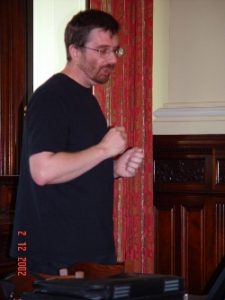Professor Paul A. Swatman BAppSc, PGDipCompSc, PhD, FACS
I held Professorial Chairs at a number of universities in Australia and Europe and visiting professorships in Australia, Europe and the US.
Immediately after retiring from full-time academic work, I maintained a focus on consultancy and applied research in ICT-enabled organisational change through Solution Forest and retained a university link as Adjunct Professor of Information Systems at the University of Tasmania and as an Honorary Research Fellow at the Informatics Institute, University of Zurich.
While at UTas, I supervised doctoral students, gave a number of guest lectures and chaired the University Animal Research Ethics Committee

Consultancy
I maintained a consultancy practice during the whole of my academic career, the focus of my consultancy work and my research developing in parallel.
Most recently, I led two projects each of which focused on the implementation of formal information systems within not-for-profit organisations. While the organisations in question were quite dissimilar in size and structure, there are significant common issues to be overcome.
By far the most significant challenge was the establishment of a systematic approach to information management while maintaining (ideally, enhancing) the motivation of a vocational and in significant part, voluntary workforce.
You can find slightly more detail about my professional and academic career at Linked-in.
Research
My research has focussed on socio-organisational enquiry and the application of associated enquiry techniques to socially pervasive ICT innovation, ICT-mediated organisational change and team (initially teams of requirements engineers, later with a much broader focus) support. The core piece of work from which all this research grew was systems analysis/requirements engineering methodological work undertaken from two perspectives:
- How analysts/requirements engineers understand and model the problem domain.
- The application of the RE methodological outcomes “in the field”.
Studies originally focussed mainly on the eCommerce domain and, within that domain, on change within organisations, organisational networks (virtual organisations), and communities resulting from and enabled by telecommunications-based systems. Of course, the insights gained from this strand of research feed the first, more abstract, strand of research.
More recently, my main focus has been on stimulating and managing effective change in organisations (such as non-profits, hospitals, universities) where there the workforce exhibits a strong vocational (or “intrinsic”) motivation. Frey’s work on “Motivation Crowding Theory” explains why such organisations respond badly to conventional approaches which are typically founded on extrinsic incentives to change and penalties for failing to change.
More detail may be found at ResearchGate.
Publications
I have published more than 150 articles in refereed academic journals, books and conferences and have refereed articles for most of the major journals and conferences in the Information Systems and Requirements Engineering domains.

Research Supervision
I have supervised 8 Honours, 7 Masters/Diplom and 15 PhD theses to successful completion.
The education of research students was a major focus of both Paula’s and my academic careers.
We developed and have continuously enhanced a course in research design and methodology for research students in the information systems/technology domain. This course, designed around the independent development of a thesis research proposal by each student, has been offered at Curtin, Swinburne, Monash, Deakin and South Australia universities in Australia, and at SIMT and the universities of Koblenz and Zurich in Europe.
I have acted and external examiner of 10 Masters, 8 Doctoral and 2 Habilitation theses for Universities in Australia (Monash, Queensland, UTS, Deakin, Macquarrie, Flinders and Western Australia), Germany (Koblenz and Mannheim), Singapore (NUS) and Switzerland (Zurich and St Gallen)
